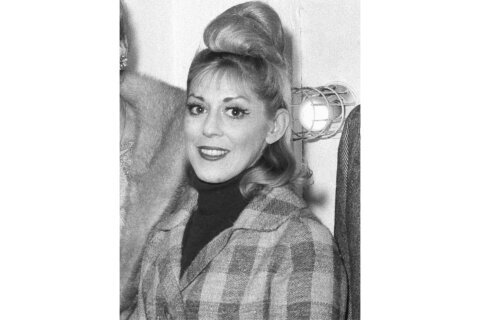WASHINGTON — It’s a live movie concert — 65 million years in the making.
Oscar-winning composer Michael Giacchino presents “Jurassic World: In Concert” at 8 p.m. Wednesday at the Kennedy Center. The 2015 blockbuster will be shown on a giant HD screen with live musical accompaniment by the NSO Pops, conducted by the prolific Emil de Cou.
“They’re going to see giant dinosaurs, they’re going to see a giant orchestra, and they’re going to see the orchestra do the tightrope act of having to play the entire score in front of you with no mistakes, because the movie doesn’t stop, it just keeps going,” Giacchino told WTOP.
If you arrive an hour early, the Smithsonian National Museum of Natural History will lead a dinosaur and paleontology discussion at 7 p.m. in the Kennedy Center Concert Hall. After the screening, stick around for a panel discussion with Giacchino, de Cou, writer-director Colin Trevorrow and the Smithsonian’s so-called “Curator of Dinosauria” Matthew T. Carrano.
“You can come ask questions of Colin and I and hear us talk dinosaurs with expert dinosaur people,” Giachinno said. “I’ve always wanted that title, but I don’t have enough expertness.”
He is, however, an expert in movie scores. When composing “Jurassic World,” he had to follow the iconic John Williams’ score from Steven Spielberg’s original smash “Jurassic Park” (1993).
“First of all, every John Williams score is the greatest thing ever because he is just the best there is,” Giacchino said in awe. “It’s so fun to be part of something that both he and Steven Spielberg had a hand in years ago. These are films I loved so much growing up and as I got older, so I’ve been following them forever. At first, it’s slightly intimidating, but in the end, the job is really just to do what’s right for the film, to tell the right story for the film musically.”
Giachinno tried to weave in subtle callbacks to Williams while also making the score his own.
“Sometimes that means we’re going to use a little bit of John’s theme … to make a point,” he said. “Other times, it means the film needs a completely new thing. It’s important when you’re bringing these franchises back and trying to make them new again for the public to do something new for them. … It’s striking that healthy balance of making sure we have what we know the fans love and that we love about the old movies, but also bringing something new.”
It’s not the first time that Giacchino has had to score a sequel to a Hollywood classic. His score for “Star Trek ” (2009) followed Jerry Goldsmith’s score for “Star Trek: The Motion Picture” (1979); “Rogue One” (2016) followed Williams’ score for “Star Wars” (1977); and “War for the Planet of the Apes” (2017) followed Goldsmith’s iconic score for “Planet of the Apes” (1968).
“‘Planet of the Apes’ was one of my earliest obsessions,” he said. “I still have all my toys sitting behind me in my office. To get onto that film was one of the most fun things that could have happened. … I got to work with a few of the musicians that played on the original ‘Planet of the Apes.’ One in particular, Emil Richards, a percussionist … played with Goldsmith on that film and actually made instruments for the movie, which he then gave to me on the new one.”
Which other classic Hollywood composers inspired Giacchino?
“Max Steiner is one of my absolute favorites. Max penned what would become the very first film score as we know it today for ‘King Kong.’ … You forget that man set the template that we still follow 100 years later,” Giacchino said. “Also, Bernard Herrmann, Jerry Goldsmith, Franz Waxman. … The moment I mention one, I think of another one — ‘Lawrence of Arabia,’ then all of a sudden ‘Poltergeist’ pops into my head, then I start thinking of ‘Gone With the Wind.'”
Giacchino has made history himself scoring a string of beloved Pixar animated flicks. After scoring “The Incredibles” (2004) and “Ratatouille” (2007), he won an Oscar for scoring “Up” (2009), which memorably opens with a tear-jerking, 10-minute montage with no dialogue.
“Originally, there was supposed to be sound effects and everything in that scene,” Giacchino said. “It was Pete [Docter] … who turned to Michael Semanick and said, ‘Maybe we should try this with no effects.’ So when they went to the dub stage with the piece, that’s what they did. Everyone watched it and I guess everyone felt like it worked. … It makes it more emotional, too. When you watch it, you’re really focused on just the emotions of what’s happening.”
A few years later, he wrote the beautiful, circular piano score for “Inside Out” (2015).
“I wanted something that felt very simple,” he said. “I didn’t want it to be clouded with a big, complicated statement of what I think the brain is, or what I think emotions are. … I was just sitting at the piano messing around and I just had this idea and kept playing it over and over, and it became very hypnotic and very much like a recurring thought. … The first time I played it for Pete Docter, he just hugged me and said, ‘That’s it! That is my movie right there.'”
Most recently, he penned the score for “Coco” (2017), which required a unique Latin flavor.
“I really wanted it to sound like it was born out of Mexico,” Giacchino said. “I grew up listening to a lot of Mexican music. … It was lyrical, it had great melodies, the harmonies were just warm and embraced you. That’s very much how that culture is: it’s warm, it embraces you, and it wants you to explore it in a way that’s all about love. That’s kind of what that movie was.”
His score was paired with Kristen and Robert Lopez’s Oscar-winning song “Remember Me.”
“Isn’t that one of the best songs ever? I really think that song will go down in history as one of those ‘White Christmas’-type songs where everyone will know it. It’s such a beautiful song. They are such great people. We had a lot of fun. I just couldn’t love them or their work enough.”
By then end of the movie, both parents and children were weeping openly in the theater.
“Good!” Giacchino joked. “I’m glad. That makes me very happy. I’m one of the few people that is very happy when someone tells me I made them cry.”
Find more details on the venue website. Listen to our full chat with Michael Giacchino below:








